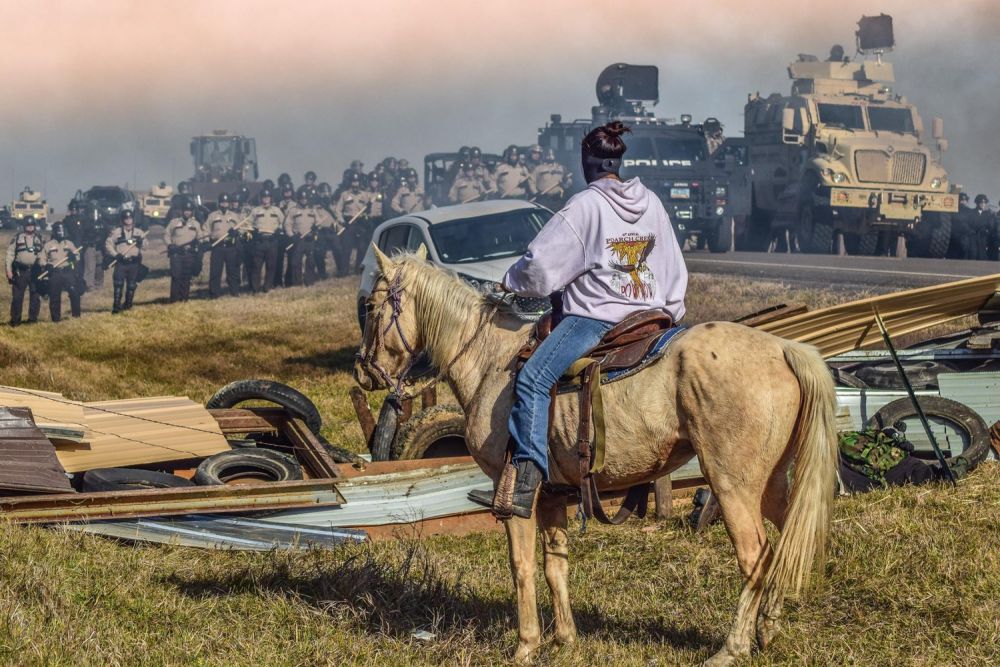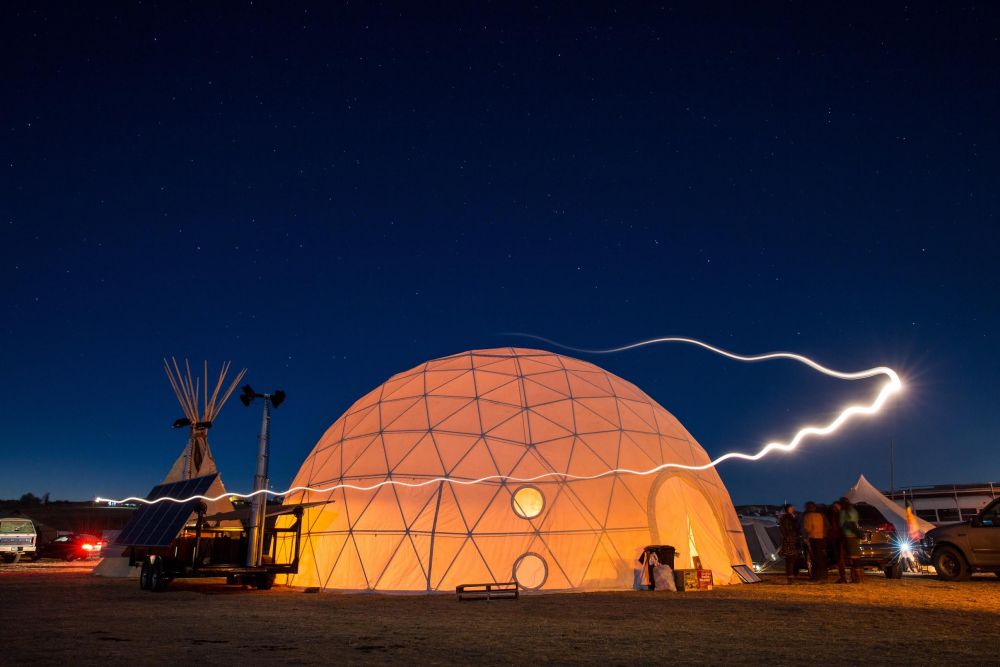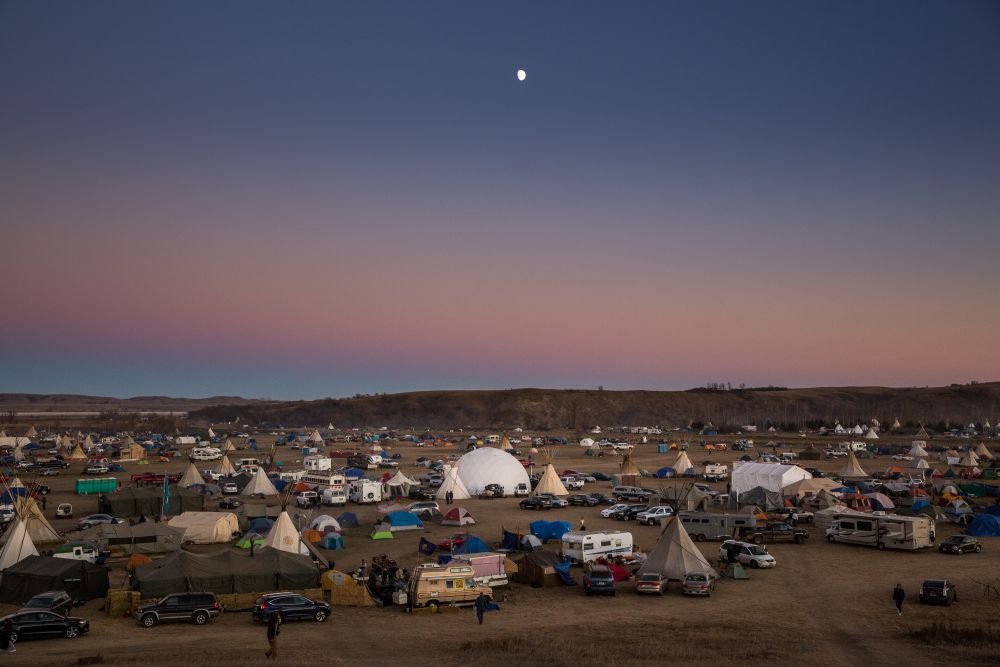A Moving Experience
The United States hadn’t seen a gathering like it since 1876. Beginning in April 2016, thousands of indigenous people and their allies camped on the prairie at Standing Rock to oppose construction of the Dakota Access Pipeline through Native American land, and crucially, under the Missouri River.
“Standing Rock was a completely unprecedented event,” said Todd Darling, an independent documentary filmmaker who spent several months at the camp. “It was the first time since Custer’s Last Stand at Little Bighorn that this many tribes of the Great Sioux Nation have gathered together in one place.” The encampment was evicted in February 2017 and the people — known as “Water Protectors” — have dispersed.
On Friday, May 19, seven indigenous Water Protectors, including two co-founders of the camp, key organizers of nonviolent direct actions, and media makers, will by welcomed by members of the Chumash community and speak together with UCSB and Chumash panelists at the conference, “Water Is Life: Standing with Standing Rock.”
“The panels will explore this historic gathering and point to ways forward,” said co-organizer Janet Walker, professor and chair of UCSB’s Department of Film & Media Studies. “We are excited at the prospect of learning from and supporting these leaders who have been so effective in articulating both the depredations of oil extraction and new socio-political configurations for change.”
The conference is part of four days of events May 17-20, all free and open to the public. It recognizes indigenous-centered leadership in the fight to protect the planet. For the conference, a ticket and 12:15 p.m. arrival is required to guarantee admission. Register for tickets here.
Events will kick off May 17 with the collective construction of the “Red Lightning Dome” — the same dome that served as a central gathering space for the main camp at Standing Rock — on the Visitor Center Lawn at UCSB. The dome will be a focal point and venue for presentations, discussions and other activities throughout “Water is Life,” beginning with a 7:30 p.m. screening of the feature documentary “Awake: A Dream from Standing Rock,” with filmmaker Myron Dewey.
On Thursday, May 18 at 9 a.m., “Water Is Life” participants will have the opportunity to experience a day at camp. At Standing Rock, Johnnie Aseron, currently a co-coordinator for the Four Bands Greater Sioux Nation Camp in North Dakota, engaged newcomers to the camp — especially non-native allies — in learning about the seven Lakota values and integrating into the cultural protocol of the Standing Rock first nations community. At UCSB, he will offer the process, which he defines as a “hoop,” to students and the campus community at large. The process lasts approximately three hours; people are welcome to stay the entire time. There will be additional activities in the dome throughout the day.
The May 19 conference will begin with the Chumash welcome at 12:30 p.m., followed by the first panel, “Protecting the Land and Water.” Moderated by Margaret McMurtrey, a Ph.D. candidate in UCSB’s Department of Religious Studies and one of the “Water Is Life” co-organizers, the panel will examine ongoing non-violent resistance to oil and other resource extraction as well as the mobilization of tribal solidarity and community building. Inés Talamantez, an associate professor in the Department of Religious Studies, will be among the panelists.
The second panel, from 3 to 4:30 p.m., will examine the role of the media. Moderated by Darling, it will look at the failures and successes of reporting from Standing Rock.
The final panel, from 5 to 6:30 p.m., “Decolonization and Indigenous-Centered Leadership,” will be moderated by Paula Antoine, Sicangu Lakota and co-founder of the Rosebud Spirit Camp in opposition to the Keystone XL pipeline prior to her work at Standing Rock.
The event will conclude Saturday, May 20, at 10:30 a.m. with a walk from Anisq’oyo Park in Isla Vista to the Red Lightning Dome, followed by words from Standing Rock guests and local Chumash leaders, prayer, music, dance and the collective taking down of the dome.
“Water Is Life” is presented by UCSB’s Carsey-Wolf Center in partnership with the Coastal Band of the Chumash Nation, the campus's Interdisciplinary Humanities Center and a host of campus entities. Walker said the co-organizers, who also include Claudio Fogu, an associate professor in UCSB’s Department of French and Italian, are grateful to the American Indian & Indigenous Collective for their support and their role in the planning the event. The collective includes UCSB faculty and staff members, students and community members.






